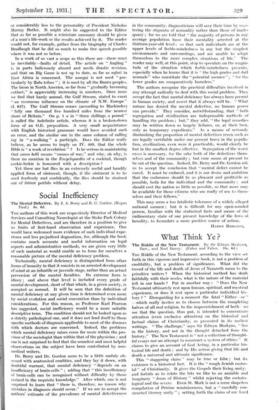Social Inefficiency
TILE authors of this work are respectively Director of Medical Services and Consulting Neurologist at the Stoke Park Colony for Mental Defectives, and are therefore in a position to give us fruits of first-hand observation and experience. One would have welcomed more evidence of such individual expe- rience and less prejudiced dogmatism, for, although the book contains much accurate and useful information on legal aspects and administrative methods, we are given very little of such material as would enable us to form for ourselves a reasonable picture of the mental deficiency problem.
Technically, mental deficiency is distinguished from other forms of insanity in that it consists in an arrested development of mind at an infantile or juvenile stage, rather than an actual perversion of the mental faculties. Its extreme form is idiocy ; and above that level is included every grade of mental development, short of that which, in a given society, is accepted as normal. It will be seen that the definition of mental deficiency at any given time is determined even more by social evolution and social convention than by individual considerations. For this reason, as Professor Karl Pearson has suggested, social inefficiency would be a more suitable descriptive term. The condition should not be looked upon as a strictly pathological one, and it does not lend itself to those specific methods of diagnosis applicable to most of the diseases with which doctors are concerned. Indeed, the problems which mental deficiency raises come far more within the pro- vince of the sociologist than within that of the physician ; and one is not surprised to find that the soundest and most helpful observations on the subject have been contributed by non- medical writers.
Dr. Berry and Dr. Gordon seem to be a little unduly ob- sessed with anatomical crudities, and they lay it down, with doubtful warrant, that mental deficiency " depends on an insufficiency of brain-cells " ; adding that " this insufficiency of brain-cells can be recognized without difficulty by those trained in the requisite knowledge." After which, one is not surprised to learn that " there is, therefore, no reason why mistakes in diagnosis should occur." If we are to accept the authors' estimate of the prevalence of mental defectiveness in the community, diagnosticians will save their time by mas- tering the stigmata of normality rather than those of' inade- quacy ; for we are told that " the majority of persons in any average population have their mentality arrested at the thirteen-year-old level ; so that such individuals are at the upper levels of feeble-mindedness in any but the simplest . environments and surroundings, and are unable to adapt themselves to the more complex situations of life." The reader may well, at this point, stop to speculate on the magni- tude of the situation which feeble-mindedness presents, especially when he learns that it is " the high grades and dull normals" who constitute the " potential menace" ; " for the lower grades are comparatively harmless."
The authors recognize the practical difficulties involved in any attempt radically to deal with this social problem. They accept the fact that mental deficiency has always been present
in human society, and assert that it always will be. What nature has denied the mental defective, no human power can provide." They consider, notwithstanding, that " both segregation and sterilization are indispensable methods of handling the problem ; but," they add, " the legal remedies may be written down as largely failures, or, at their best, only as temporary expedients." As a means of seriously diminishing the proportion of mental defectives (even such as are legally certifiable under our present laws) in the popula- tion, sterilization, even were it practicable, would clearly be but in the smallest degree effective. Segregation of the worst cases is necessary, for the sake both of the defectives them- selves and of the community ; but cure seems at present to be out of the question. Indeed, Dr. Berry and Dr. Gordon ask us to accept the conclusion that " mental defect cannot be cured. It must be endured, and it is our desire and ambition that the endurance should be as pleasant and profitable as possible, both for the individual and the community ; and should cost the nation as little as possible, so that more may be available for those citizens who are really of use to them- selves and their fellows."
This may seem a too fatalistic tolerance of a widely alleged national menace ; but it is difficult for any open-minded person, familiar with the statistical facts and aware of the rudimentary state of our present knowledge of the laws of heredity, to formulate a more positive course of action.
HARRY ROBERTS.






























 Previous page
Previous page